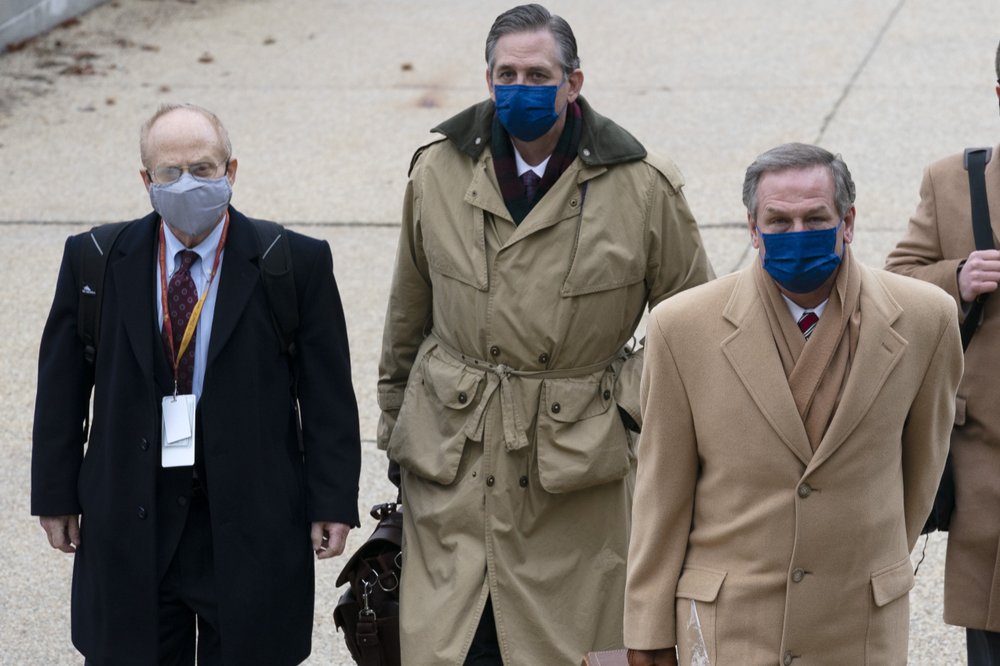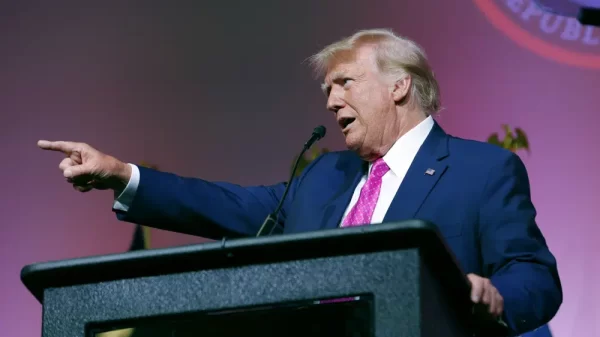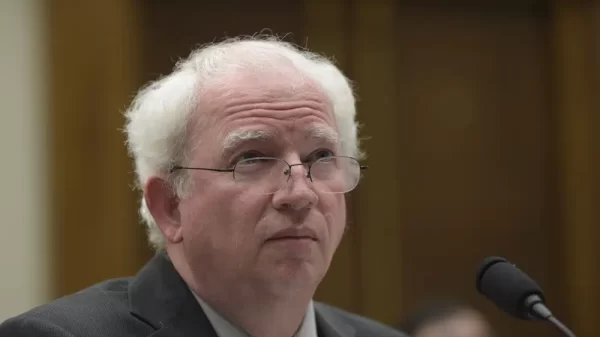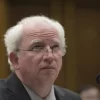From left, David Schoen, Bruce Castor and Michael van der Veen, lawyers for former President Donald Trump, arrive at the Capitol on the third day of the second impeachment trial of Trump in the Senate, Thursday, Feb. 11, 2021, in Washington. (AP Photo/Jose Luis Magana)
HARRISBURG, Pa. (AP) — Bruce L. Castor Jr. answered his cellphone, but he had no time to talk.
“I’m 12 minutes from prime time,” he said, before heading to the well of the U.S. Senate to defend his client, Donald Trump, as one of two defense lawyers in the ex-president’s second impeachment trial.
It may have marked the high point for him.
Castor’s moment in the national glare, televised from the well of the Senate chamber, was seen as an ambling and at times aimless hour-long disquisition in search of a point. And that was just the opinion of several Republican senators, including steadfast supporters of the president.
“I thought I knew where he was going, and I really didn’t know where it was going,” said Sen. Lindsey Graham, R-S.C., who is among Trump’s most fervent backers.
Sen. John Cornyn, R-Texas, added that Castor “just rambled on and on and on.”
It was at odds with Castor’s reputation as a sure-footed, loquacious, media-savvy prosecutor from the Philadelphia suburbs who for decades had seemed as comfortable in front of a camera as in a courtroom.
To be sure, he was not Trump’s first choice for a lawyer, and perhaps not among the top ten of the limited options among those willing to take the case. He had to prepare his arguments in a matter of just a few days after the former president’s legal team quit. And he had to learn the rules of an impeachment trial, a rarefied legal specialty.
Castor will have a chance to make a different impression when he begins to present Trump’s defense, expected Friday.
Still, he stumbled in his first appearance Tuesday, referring to himself as the “lead prosecutor” for Trump’s defense, before correcting himself, and called House managers — the real prosecutors in the case — “brilliant” and their presentation “well done.” He also acknowledged something that former president has not, namely that Trump lost the election.
Instead of arguing a legal theory, he instead tried a political one, that Democrats only brought the impeachment on because they wanted to foreclose any chance of Trump running for president again.
“Let’s understand why we are really here,” Castor said. “We’re really here because majority in the House of Representatives does not want to face Donald Trump as a political rival in the future. That’s the real reason we’re here.”
He said he made that point to strip the bark of any other pretense. “Nobody says it that plainly, but unfortunately I have a way of speaking that way,” Castor said.
Castor, 59, is familiar with politics, being elected as the ambitious, cowboy-booted and pinstripe-suited prosecutor from one of the state’s wealthiest and most heavily populated counties in suburban Philadelphia.
There, he was accustomed to securing murder convictions and standing in front of the lights and cameras from Philadelphia TV stations, making him well known in the state’s most politically dominant region.
But if he wanted to use that position as a springboard to higher office, the plan did not work out. In the middle of his eight years as Montgomery County’s district attorney, he took on the Republican Party’s hand-picked candidate for state attorney general, slugging it out with the establishment in an expensive and nasty primary. He lost by about 5 percentage points.
Castor went on to become a county commissioner, but found himself sidelined by his colleagues, a Republican and a Democrat, who forged a working majority that froze him out. Castor hung his commissioner’s certificate in the bathroom, above the office toilet.
In 2013, he became a strident critic of then-Gov. Tom Corbett, the Republican who had beaten Castor in 2004′s primary for attorney general.
He toured the state exploring a primary challenge to Corbett’s reelection bid, but Castor dropped it, lamenting that not enough people “were willing to stick their necks out and back me.” Corbett’s unpopularity ultimately led to his historic defeat.
Castor then ran for his old job as district attorney in the middle of emerging allegations that comedian Bill Cosby had sexually assaulted dozens of women and that he — Castor — had declined to prosecute one such case a decade earlier.
His decision not to prosecute became his Democratic opponent’s central line of attack in the race. He defended himself by saying there was not enough evidence to successfully prosecute, but he lost and, later, went on to testify for Cosby’s defense.
In doing so, he also questioned the credibility of the victim, Andrea Constand, who sued him for defamation. They settled the case in 2019.
Before Cosby was convicted in a second trial, Castor burst back on the scene as Pennsylvania’s first-ever solicitor general.
In it, he stepped in to make legal decisions in the administration for the state’s embattled and politically abandoned attorney general — Kathleen Kane, a Democrat — as she fought charges of leaking protected investigative information to smear a rival and lying to a grand jury about it.
She was soon convicted, leaving Castor as the state’s acting attorney general — the position he had so long ago sought — but only for two weeks until an appointee of the governor took over.
His re-emergence as an impeachment lawyer for Trump was a head-scratching moment for Pennsylvania’s political and legal world. Rob Gleason, a former state party chairman who helped with Trump’s re-election campaign, called Castor to congratulate him, but hadn’t spoken to him in five or six years.
“I had no knowledge who it was going to be, I never even thought about it, but yeah, I was surprised it was him,” Gleason said.
Castor had burned bridges with much of the Republican establishment.
“The Republican Party is dead in Pennsylvania, never to rise again,” he declared to the Philadelphia Inquirer in 2015.
He had pretty much stayed out of sight, seemingly content to never run for office again.
He had not campaigned for Trump and a longtime friend, Brian Miles, told the Inquirer that the two men had never discussed Trump before Castor mentioned recently that he was up for the job.
Castor answered the mystery, telling the Washington Post that his cousin, a House Republican staff lawyer, had “served as a conduit.”
A few weeks later, there he was, checking notes on a yellow legal pad in the well of the Senate, and speaking as the world watched.
For all the criticism directed at him, Castor suggested that Trump did not criticize his performance.
“Far from it,” he said. And of the broader criticism, he said, “only one person’s opinion matters.”
Copyright 2020 Associated Press. All rights reserved.










































